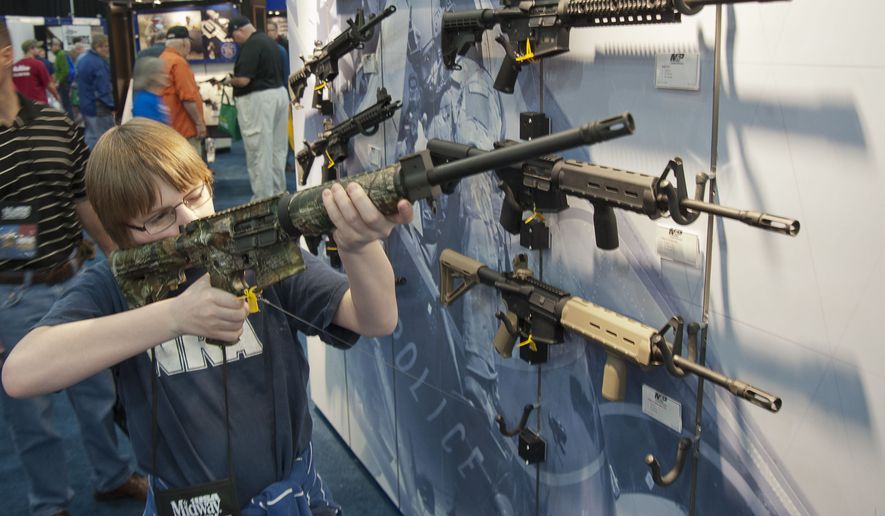LOUISVILLE — Gun rights backers lament what they describe as a leftward drift on Second Amendment rights by Democrats in recent years, and predicted the push for stricter laws in blue state bastions such as California and Illinois will cost them even more independent-minded voters.
Within the last decade, Democrats, including then-Senate Majority Leader Harry Reid, were making overtures to gun groups including the National Rifle Association.
But the 2012 Newtown school shooting spurred a realignment, with Democrats at the national level increasingly adopting a gun control posture, pushing gun rights Democrats to suppress their own views, said attendees at the National Rifle Association’s annual convention, which kicked off Thursday in Louisville.
“They have shifted. Oh, heavens yes I’d say the last eight years,” said Sandy Jarrett, a 60-year-old retiree from Troy, Ohio. “You go back to Kennedy and all the other Democrats — they were pro-gun. There was never an issue.”
That’s in stark contrast to people like President Obama and likely Democratic presidential nominee Hillary Clinton, who talk about having to “kill the guns,” she said.
The lineup at this week’s NRA convention underscores the lopsidedness of the debate. Likely GOP presidential nominee Donald Trump is a featured speaker, as are Republican governors from Indiana and Kentucky, both Republican U.S. senators from Kentucky, Republican Sen. Jeff Sessions of Alabama and GOP Rep. Trey Gowdy of South Carolina.
Among Democrats, meanwhile, the featured speaker at the NRA lobbying arm’s “Leadership Forum” on Friday is Milwaukee County, Wisconsin, Sheriff David A. Clarke Jr., who’s carved a niche as a pro-gun rights Democrat. He addressed the convention in 2015 too.
Timothy Mullins, a 49-year-old Kentucky state trooper, said the crowd at the NRA convention would at least listen to what a Democrat had to say — but that the posturing of the national party on the gun issue has made such a scenario all the more difficult.
“I think a lot of the other national-level Democrats they would use it against them,” he said. “They would, in the future, say, ’well, they were here — they supported this. And on the national level, we don’t support this.’”
“They would view that as basically an endorsement of the NRA,” Mr. Mullins said.
“A large portion of the Democrats nationally are more conservative than people think they are,” he said. “In this state, there’s lots and lots of people that are registered Democrat that are very conservative people.”
But those conservative gun rights Democrats don’t appear to control their party, even in Kentucky.
Jeff Kender, who unsuccessfully sought the Democratic nomination in Kentucky’s U.S. Senate race this year, actually did try to separate himself from national Democrats on the issue in a debate ahead of the May 17 primary.
“I consider myself an old-school Democrat — FDR, JFK, LBJ Democrat,” Mr. Kender said.
But Mr. Kender won just 5 percent of the vote in the contest earlier this week, while Lexington Mayor Jim Gray secured the nomination with nearly 60 percent of the vote out of a crowded field of Democrats seeking the right to face Sen. Rand Paul in the fall.
Jim Yost, a retiree in his 70s from Red Bluff, California, said Democrats’ iron grip on his state government — which the party has used to try to strengthen California’s already-tough gun laws — has gotten out of hand.
“Quite frankly, we vote Democratic occasionally, but right now it’s just crazy,” said Mr. Yost, who was with his wife, Judy Oswald.
“We aren’t radical people. We’re very middle-of-the-road,” he said. “Quit laying all these crazy laws on us. It just doesn’t make any sense [because] it doesn’t do anybody in the country any good.”
California is dominated by Democrats, as are Maryland and Illinois — also states that have pushed strict firearms restrictions in recent years.
Larry Seitz, 63, a retired maintenance executive from outside of Chicago, said he’s had enough with his state’s laws. He said he learned to shoot from an early age and is a competitive archer — but that he still got put through the wringer when he tried to get a concealed carry permit in the state.
“I’ve had 30 hours of training to get my concealed carry. I’m not afraid of a background check, but some of the other stuff it doesn’t make sense. It seems more like harassment,” he said. “In Illinois, they know more about me than they do about the guy in the penitentiary.”
Mr. Seitz said that, more broadly, Republican presidents have consistently stood up for the Second Amendment, while he saw “a lot of harassment of firearm owners” during the Clinton administration in the 1990s.
“I think a lot of people come out just from frustration [and] would join the NRA,” he said. “They’re our voice.”
• David Sherfinski can be reached at dsherfinski@washingtontimes.com.




Please read our comment policy before commenting.